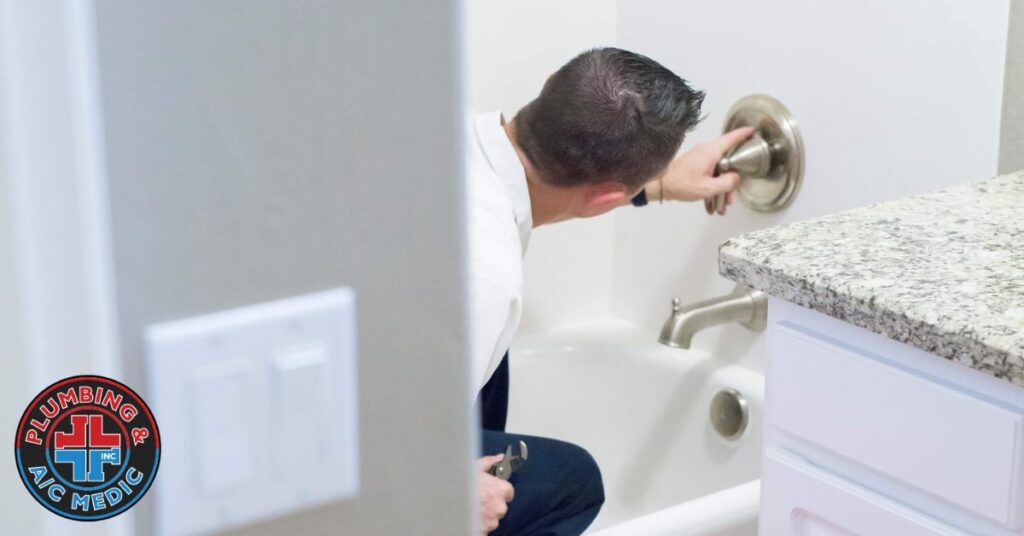Beginner's Guide to Efficient Bathroom Plumbing Maintenance
Beginner's Guide to Efficient Bathroom Plumbing Maintenance
Blog Article
The article author is making several great pointers on Essential DIY Bathroom Plumbing Tips Every Homeowner as a whole in the content directly below.

For brand-new homeowners, understanding and maintaining restroom plumbing can conserve both money and time by preventing pricey issues down the line. Right here are some vital bathroom plumbing suggestions to aid you maintain every little thing running smoothly.
Acquaint Yourself with the Main Shut-Off Shutoff
Recognizing where the major water shut-off valve is located in your home is important. This allows you to promptly switch off the water supply in case of significant leaks or during pipes emergencies, protecting against extensive water damages.
On A Regular Basis Examine for Leakages
Small leakages can lead to huge problems. On a regular basis check under sinks, around bathrooms, and near pipes components for any kind of signs of leaks. Seek dampness, little drips, or rust. Catching and repairing leaks early can stop more serious damages and conserve water.
Do Not Overlook Slow Drains
If your sink or bathtub is draining gradually, it's usually a sign of an obstruction developing. Addressing this early can prevent a total blockage. Make use of a plunger or a plumbing's serpent to remove particles. Stay clear of making use of chemical drainpipe cleansers as they can damage your pipelines over time.
Know What Not to Flush
Toilets are not garbage disposals. Avoid flushing anything besides bathroom tissue and human waste. Things like wipes, womanly hygiene items, and cotton bud need to be disposed of in the garbage to stop clogs and drain back-ups.
Set Up Strainers in Drains
Location filters in your sink and bath tub drains to catch hair and other debris prior to they enter your pipes system. Cleaning the filters on a regular basis will assist stop buildup and maintain water moving openly.
Preserve Your Hot Water Heater
Guarantee your water heater is set to an ideal temperature (usually around 120 levels Fahrenheit) to avoid scalding and minimize energy usage. Flush the storage tank each year to eliminate sediment buildup, which can decrease the effectiveness and life-span of your heater.
Upgrade Your Components
If your home has older fixtures, consider upgrading to more effective designs. Modern toilets, showerheads, and faucets are created to utilize much less water while supplying excellent pressure, which can significantly lower your water bill and environmental footprint.
Be Cautious with DIY Pipes Repair Works
While it's alluring to take care of all home repairs on your own, beware with plumbing. Some concerns may need expert competence, specifically if they involve primary water lines or sewage system repair work. Working with an expert can often be much more affordable than DIY, particularly if it protects against additional damage.
Get Ready For Cold Weather
Protect your pipes from freezing throughout winter by protecting pipelines in unheated areas like cellars, attic rooms, and garages. Throughout extreme cold, let cold water drip from faucets offered by subjected pipelines to aid stop freezing.
Set Up Routine Upkeep
Consider organizing annual examinations with an accredited plumbing. They can identify concerns that you could miss out on, such as covert leaks or damage on pipelines and components. Regular upkeep helps extend the life of your plumbing system and can protect against emergency situations.
Conclusion
Comprehending and keeping your home's washroom plumbing can protect against several usual problems. By following these vital suggestions, you can guarantee your bathroom remains practical and reliable, conserving you time and money in the long run.
Essential Plumbing Tips for Homeowners: Keep Your Pipes Flowing Smoothly
As a homeowner, understanding the basics of your plumbing system can save you time, money, and a lot of headaches. Plumbing issues can range from minor annoyances like dripping faucets to major problems like burst pipes that cause significant damage. This guide provides essential tips to help you maintain your plumbing system and tackle common issues.
Understanding Your Plumbing System
Supply System: Brings fresh water into your home from a municipal source or a well. Drain-Waste-Vent System: Removes wastewater and vents sewer gases outside. Fixtures and Appliances: Includes sinks, toilets, showers, dishwashers, and washing machines. Basic Maintenance Tips
Regular Inspections: Periodically check for leaks, corrosion, and other signs of wear and tear. Look under sinks, around toilets, and near water heaters. Know Your Main Shut-Off Valve: In case of a major leak, you’ll need to shut off the water quickly. Ensure everyone in your household knows where the main shut-off valve is located. Prevent Frozen Pipes: In cold climates, insulate exposed pipes and let faucets drip during extreme cold to prevent freezing. Use Strainers: Install strainers in sinks and tubs to catch hair, food particles, and other debris that can cause clogs. Common Plumbing Issues and Solutions
Clogged Drains:
Prevention: Avoid pouring grease down the drain and use drain screens to catch debris. DIY Fix: Use a plunger or a plumbing snake to clear minor clogs. For stubborn clogs, a mixture of baking soda and vinegar can sometimes help. Leaky Faucets:
Prevention: Replace washers and seals regularly. DIY Fix: Turn off the water supply, disassemble the faucet, and replace worn parts.

Call Today Report this page